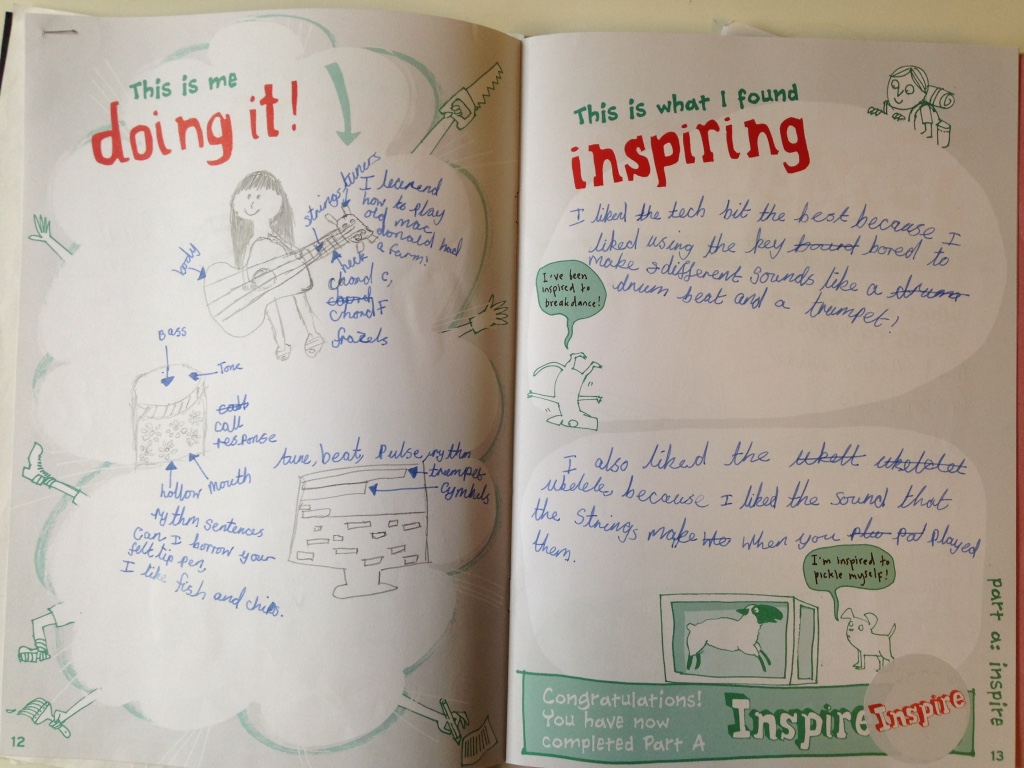Context: Thameside is a co-educational primary school, which caters for children between the ages of four and eleven years. This was the first time the school had worked on an Arts Award project.
The lead teacher attended a Reading CAN networking event all about Arts Award, where they got to find out what the Arts Award was, meet the Readipop and Jelly Team’s and then meet a series of practioners working in different arts forms. At the event Readipop invited proposals from the schools present on running their own Arts Award project.
Prior to the project, the lead teacher undertook discover and explore advisor training, the only teacher to do so across Readipop’s pilot programme.
The school were keen to work with a range of practitioners across a range of art forms. Additionally they wanted to visit the places where the artists work.
Approach:
The project started with the school visiting two Reading based arts organisations, Jelly (visual arts) and Readipop (music), the school were keen to do this in order that the young people can see the artists at work. Whilst at each centre they took part in a range of arts activities:
- Ukulele & singing (Readipop)
- Djembe drumming (Readipop)
- Music production (Readipop)
- Print making (Jelly)
- Visual Art (Jelly)
Prior to the visits the lead teacher had made school staff aware of the need to gather evidence from each session and Readipop had supplied each member of staff with an iPad to take photos on. Additionally the lead teacher had prepared the young people for the visit, explaining that they were doing an Arts Award and helping them prepare question to ask the artists and the arts organisations. This allowed the visit to help the young people achieve several elements of their award:
- Trying more than one art form
- Finding out about an artist
- Finding out about an arts organisation
When back at school the young people completed the relevant sections of the arts log with pictures they had drawn and photos the teachers and teaching assistants had taken.
Young people then selected which taster activity they had enjoyed the most. Based on what they had chosen there was follow up activity, during which time they got to have sessions and improve on the instrument/art form, this time was also used to create a piece of art.
The final aspect of the project was the share activity, where the young people presented to another class their finished artwork and talked about their role in creating it, they also took questions from the other class. These were done within school and needed no support from Readipop.
Some of the share activities had to be done again as there was insufficient evidence of the young people doing them.
Final portfolios were in the form of the Trinity arts logs, they were complied by the young people throughout the project. At the end of the project prior to moderation the lead teacher and Readipop project leader went through each portfolio to check that all the required evidence was present. Where there was insufficient teacher went back to the young people and helped them complete it.
Only four of the young people who took part in the project were unable to gain Arts Awards, mostly this is down to them missing too many school days when Arts Award activity was taking place.
Issues arising, improvements and advice:
- Accessibility of venues/studios for large groups of young people
- Some artists had reservations about welcoming large groups of young people into their studios, although after the event there were no issues. Perhaps need a better way to explain why it’s important/useful for the artists.
- Record everything as evidence – this is really useful for the participants in remembering what they did. After a whole day it can be hard to recap what you have done.
- Recording the evidence was difficult for some of the children, and technical/staffing limitations meant I could not have individual conversations with children and record/film their answers, as had been recommended
- Think about how the young people will record their evidence, and how you will manage that.
- Make sure you understand the evidence required by Trinity, and how your project meets that need balanced with what you actually want the young people to experience.
Impact:
22 of the 26 young people achieved an Arts Award at explore level.
The young people got to go out to the studios and see real workplaces, seeing people with jobs they may not have realised existed, and experiencing different forms of the arts to find the one that inspired them the most.
Interviewing the teacher they said that they would definitely do another arts award, however felt that the model ran into limitations when trying to work with a whole class and in future would run it as an additional activity or an after school club. Readipop then used these comments and ideas to inform planning of future Arts Award projects.
Comments:
“The Arts Award project felt like a more “grown up” way of learning for those children able to work in this way, and allowed the more able children the opportunity to explore things they were interested in.” Lucy Lombos, lead teacher
“The arts award gave the young people an understanding of what being an artist actually means.” Suzanne Stallard, Jelly

